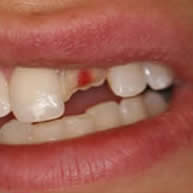Every human being is born with a different shade of tooth color. While some may be brighter white, or start with a grayer tint, there are a multitude of factors that can affect the original shade of your teeth over the course of time. Some of the issues that can change your tooth color or dim your smile’s brightness include:
- Staining foods and drinks such as wine, cola, coffee, berries, or candy are examples of foods that can alter the shade of your teeth.
- Cigarette smoking and chewing tobacco are notorious for yellowing teeth.
- Some types of antibiotics, as well as certain antihistamines, blood pressure medications, and antipsychotic drugs are known to darken or gray teeth.
- Both chemotherapy and radiation treatments are known to cause changes in the color of teeth.
- Over time, enamel wears thin and teeth accumulate tartars causing them to discolor and stain.
- Excessive use of fluoride or excessive amounts of fluoride in your water can have effects on the coloration of teeth.
- Trauma to teeth due to a fall or accident can damage nerves and result in discoloration of permanent teeth.
- Poor dental hygiene and neglecting dental cleanings can cause teeth to darken or change their shade.
Professional teeth whitening can correct many of these issues, possibly lightening your teeth as much as ten shades in as little as one visit. If any of these factors have caused your natural smile to turn dark or dingy, consult with your dental professional to find out what options they offer for whitening that would best fit your individual needs.
We offer teeth whitening at our Newport Beach CA dental office






